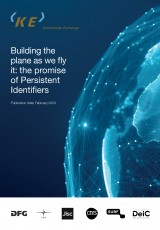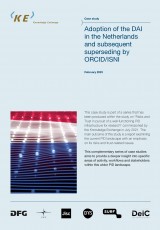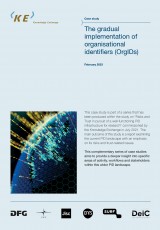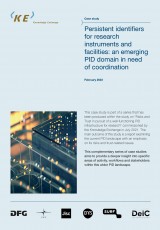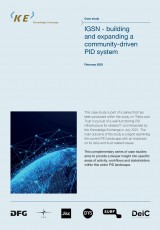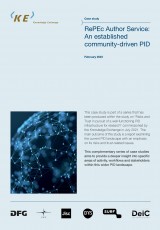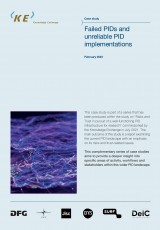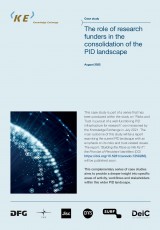
Persistent Identifiers (PIDs) and their infrastructures are of significant strategic importance to the increasingly digital reality of modern-day research. To better understand what is needed to build and exploit a well-functioning PID infrastructure for research, Knowledge Exchange (KE) conducted an in-depth investigation on PIDs, with the aim of producing recommendations for those stakeholders involved.
PIDs scoping paper
A scoping document was written by experts of the Task and Finish Group for PIDs Risks and Trust. A call for bids on further investigations resulted in consultants, scidecode science consulting, taking on the assignment ‘to identify the best possible strategic and operational paths to achieve a well-functioning PID infrastructure for KE member states and beyond.'
Building the plane as we fly it: the Promise of Persistent Identifiers
The role of Persistent Identifiers (PIDs) within modern-day research has been explored and analysed and recommendations identified, making use of the KE Open Scholarship Framework as well as the notions of Risk and Trust.
scidecode science consulting produced the report Building the plane as we fly it: the promise of Persistent Identifiers and its accompanying case studies, to support PID's role in our vision of facilitating open science. Not only does the report emphasise the risk and trust elements of PID implementation, it also focuses on providing the research community and their supporting governing institutions with an understanding of the complex and constantly changing landscape in which a well-functioning PID infrastructure must evolve.
The study includes a literature review on the main characteristics of PIDs and an analysis of interviews with a variety of actors, ranging from PID managers, owners and users to PID authorities and providers.
The published report, Building the plane as we fly it: the Promise of Persistent Identifiers, and complementary case studies provide answers to the following questions:
- What are the benefits of an efficient PID infrastructure, how does it contribute to an open infrastructure and how is this a precondition for research communities impending research agendas?
- What are important risk and trust issues that key players involved in the PID infrastructure face and what can go wrong with an unreliable PID service?
- What recommendations can be made for key stakeholder groups?
The accompanying case studies underpin the report and provide further insight into the world of PIDs, as well as helping to form the recommendations. The set of recommendations are aimed at each stakeholder group and aim to guarantee the successful implementation and management of PID processes.
The report is available here.
The accompanying case studies are available here.
Webinar
In May 2023, KE hosted their first webinar to share outcomes from the report and case studies. You can watch the one-hour recorded event below.
Webinar download documents
Transcript: KE webinar Persistent Identifiers in academia
Transcript for the Knowledge Exchange webinar - Persistent Identifiers in Academia: Risks and Trust, which took place in May 2023
Slides: Pablo de Castro Persistent identifiers in academia: risk and trust
Persistent Identifiers in Academia: Risk and Trust –The Knowledge Exchange Study - Pablo de Castro slides presented at Persistent identifiers in academia: risk and trust webinar
Slides: Gaelle Bequet Persistent identifiers in academia: risk and trust
Working with Persistent Identifiers: Focus on recommendations to research stakeholders, universities, & researchers - Gaelle Bequet slides presented at Persistent identifiers in academia: risk and trust webinar
The Task & Finish Group for PIDs Risk and Trust
The activity was led by KE representatives Frank Manista (Jisc) and Josefine Nordling (CSC). The Task & Finish Group for this activity consisted of experts from across each of the six KE partner countries:
- Rene Belsø (Expert Lead), DeiC, Denmark
- Martin Matthiesen (Expert Co-lead), CSC, Finland
- Pascal Aventurier, IRD, France
- Nathalie Fargier, CNRS, France
- Gaëlle Béquet, ISSN, France
- Jessica Parland-von Essen, CSC, Finland
- Clifford Tatum, CWTS, Netherlands
- Laurents Sesink, Leiden University, Netherlands
- Gül Akcaova, SURF, Netherlands
- Stephanie Palek, Deutsche Nationalbibliothek, Germany
- Jürgen Kett, Deutsche Nationalbibliothek, Germany
- Britta Dreyer, Technische Informationsbibliothek, Germany
- Adam Vials Moore, Jisc, UK
- Hilda Muchando, Human Made / ALTIS, UK
- Kirsty Wallis, University College London, UK
The Consultants
A team of consultants were appointed by KE to support this work:
- Ulrich Herb (https://orcid.org/0000-0002-3500-3119)
- Pablo de Castro (https://orcid.org/0000-0001-6300-1033)
- Laura Rothfritz (https://orcid.org/0000-0001-7525-0635)
- Joachim Schöpfel (https://orcid.org/0000-0002-4000-807X)
